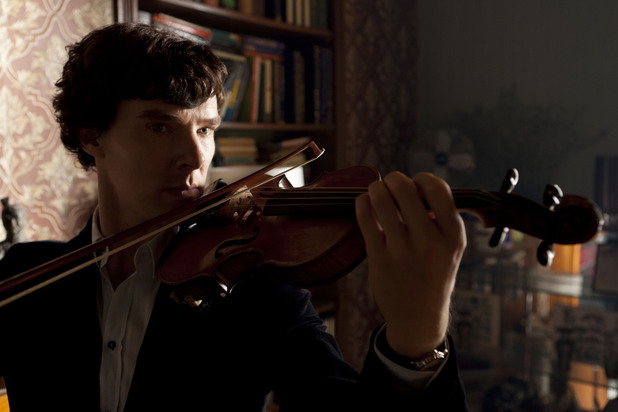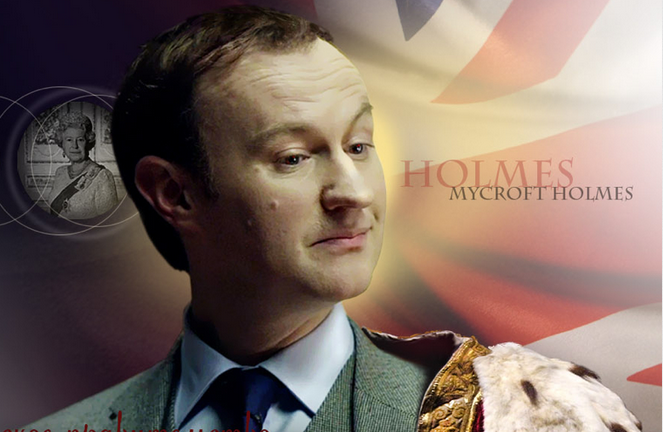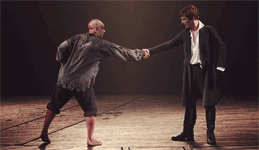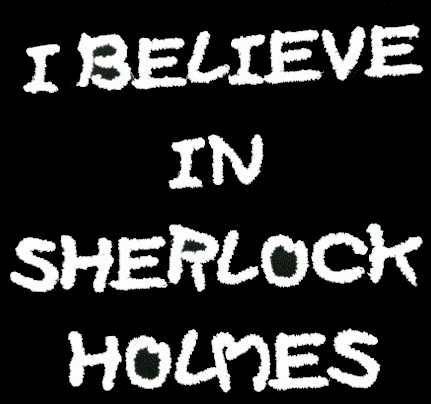
BBC Sherlock Fan Forum - Serving Sherlockians since February 2012.
- ancientsgate
- Reichenbach Survivor
 Offline
Offline 
- From: New Hampshire, USA
- Registered: June 8, 2012
- Posts: 5,532
Who Killed Shan?
At the end of this episode, Sherlock was acting all mysterious, hiding behind his newspaper at the table, looking like the cat who ate the canary, as he often does. John watched out the window as some Asian gal was outside, making a cipher grafitti on a pole/box thingie across the street from 221B. That scene segued right to Shan, speaking to her anonymous boss on a laptop, saying she would not betray him, and he said, of this I'm certain, and then he killed her. His words on the laptop were labeled only as M--- I presume this is Moriarty. But why do I sit here wondering if Sherlock was behind her death somehow?
Sorry if this discussion has already been had in another thread. I don't have half a day to sit here and look through all the 100s of posts. So what's the consensus? Was Moriarty behind this, or was it just a coincidence that her boss used the initial M? Or was Sherlock taking care of her sorry a**? Color me confused and wondering.
- Sherlock Holmes
- Administrator
 Offline
Offline 
- From: 221B Baker Street
- Registered: February 7, 2012
- Posts: 5,162
Re: Who Killed Shan?
I've always been of the impression M stood for Moriarty...which means he is in fact a presence in every single episode of Series 1 and 2.
Sherlock wouldn't assasinate someone in a pre-meditated fashion. He wouldn't hesitate to kill but only in the heat of the moment if him or his friends were in danger. That's what sets him apart from Moriarty. He's on the side of the angels remember (but not one of them).
---------------------------------------------------------------------------------------------------------------------------------------------
Eventually everyone will support Johnlock.
Independent OSAJ Affiliate

- hypergreenfrog
- John's Army
 Offline
Offline 
- Registered: June 14, 2012
- Posts: 282
Re: Who Killed Shan?
Moriarty had her killed.
Sherlock Holmes is not a gangster, he does not simply "dispose" of people, be it by sniper or any other sinister way.
That is my understanding of the scene, anyway.
________________________________________________________________________________________________________________
"There is no such word as 'impossible' in my dictionary. In fact, everything between 'herring' and 'marmalade' seems to be missing." Dirk Gently
Finally, I have made it to Cipher Expert :-))))) (8.8.2012)
- kazza474
- High Functioning Sociopath
 Offline
Offline 
- From: Australia
- Registered: February 9, 2012
- Posts: 2,845
Re: Who Killed Shan?
Sherlock doesn't kill people or have them killed.
Moriarty does.
The conclusion is logical.
____________________________________________________________________________________________
Also, please note that sentences can also end in full stops. The exclamation mark can be overused.
Sherlock Holmes 28 March 13:08
Mycroft’s popularity doesn’t surprise me at all. He is, after all, incredibly beautiful, clever and well-dressed. And beautiful. Did I mention that?
--Mark Gatiss
"I know that you believe you understand what you think I said, but I’m not sure you realize that what you heard is not what I meant."
Robert McCloskey
- ancientsgate
- Reichenbach Survivor
 Offline
Offline 
- From: New Hampshire, USA
- Registered: June 8, 2012
- Posts: 5,532
Re: Who Killed Shan?
hypergreenfrog wrote:
Moriarty had her killed. Sherlock Holmes is not a gangster, he does not simply "dispose" of people, be it by sniper or any other sinister way. That is my understanding of the scene, anyway.
We have no canonical (my idea of canon is this actual show, not that stuff from the late 1800s) evidence that he's ever been behind someone being disposed of, no. But he's not adverse to using his physical strength to lay things to rights when someone he cares about has been hurt. I guess the strongest evidence of that was in Belgravia, when he threw that CIA guy out his back window, down on top of Mrs. Hudson's trash bins, for first threatening John and Irene, and later invading his home and hurting Mrs. H. He certainly could have killed the man, whether or not that was his intention. And in BB, that Shan woman and her goons scared John and Sarah half to death and also had the lovely Asian museum worker killed. I don't think Sherlock likes bullies-- and he dislikes being outnumbered, where it makes for too much stupid in the room. So anyway, no, I can't quite picture him calling in favors to have someone taken out, or doing it himself, but... I think it would give him loads of satisfaction to know that justice had been carried out somehow and a low-life had met the end of his life.
He said with his own mouth that he's not a hero, he's not an angel, and if Moriarty wanted to meet up with him in hell, he would be okay with that idea (I'm paraphrasing). I don't think he's afraid of violence, thinks it's part of doing business with criminals, and as John told him, he attracts killers. Speaking only for myself, I guess I have no problem seeing our Sherlock with a dark edge that maybe we haven't completely delved into yet. Just me thinking out loud-- none of us has any idea where this talented group of writers and show runners and actors are going to take our guys, do we. And we shouldn't pretend we do, IMO. Never say never.
- •
- ancientsgate
- Reichenbach Survivor
 Offline
Offline 
- From: New Hampshire, USA
- Registered: June 8, 2012
- Posts: 5,532
Re: Who Killed Shan?
Sherlock Holmes wrote:
I've always been of the impression M stood for Moriarty...which means he is in fact a presence in every single episode of Series 1 and 2.
Yes, my conclusion is that it was Moriarty as well. I love how I can watch these episodes for the 3rd, 4th, 5th times or more and still see little bits of things I hadn't noticed or thought of before. Lovely.
- •
- Wholocked
- Moderator
 Offline
Offline 
- From: Australia
- Registered: March 7, 2012
- Posts: 1,811
Re: Who Killed Shan?
ancientsgate wrote:
We have no canonical (my idea of canon is this actual show, not that stuff from the late 1800s)
"That stuff from the late 1800s" is actually the very definition of the term canon in reference to original works. Check out this Wiki page. Pretty much everyone else in the fandom will use the term canon to mean ACD's works, since that's what it means. Just keep that in mind if you want to use the word in a different context - you'll need to put your little disclaimer in it every time.
-------------------------------------------------------------------------------------------------------------
I dislike being outnumbered. It makes for too much stupid in the room

- veecee
- Official Blogger
 Offline
Offline 
- From: USA
- Registered: June 11, 2012
- Posts: 1,794
Re: Who Killed Shan?
The first time I watched each episode, so much got by me. I was just caught up in the whole atmosphere and energy. I remember being a little confused by that part in the BB. But the second and subsequent times I watched I understood it to be Moriarty that had Shan killed. (He wouldn't dirty his hands personally, of course. Westwood.) I can't picture Sherlock doing any such thing. He may not be an angel, but I believe he has a certain code of honor, even if it is a little off-kilter.
- The Doctor
- British Government
 Offline
Offline 
- From: Baker Street, Sydney Australia
- Registered: June 27, 2012
- Posts: 674
Re: Who Killed Shan?
This thread, lovingly, proving, that just this once I did not overthink a Sherlock scene - I never doubted that this was Moriarty's work as indeed, it would demonstrate he has been 'in the spider's web' all along...
- Lupin
- Adler's Whip
 Offline
Offline 
- Registered: July 28, 2012
- Posts: 227
Re: Who Killed Shan?
I'd say Moriarty given the covert method of communication we later see in The Great Game from Moriarty and the suggestive handle the anonymous benefactor has. Moriarty was the "sponsor" in the first episode. No reason to believe he wasn't in the second as well.
-----------------------------------------------------------------------------------------------------------------------------------
Is the foil of a detective a thief or a magician?
My Theory on the Fall:
- Davina
- Moderator
 Offline
Offline 
- From: The Only Way is Essex UK
- Registered: February 9, 2012
- Posts: 9,714
Re: Who Killed Shan?
No query really here. Shan is talking to someone who signs themselves off as M promising that the events cannot be traced back to this M. M then says he can guarantee that and the next moment Shan is shot by a sniper; one of Moriarty's favourite MOs. This scene is specifically written into the episode to link Moriarty to the events surrounding the smuggling.
![]()
---------------------------------------------------------------------------------------------------------------------------------------------
Don't make people into heroes John. Heroes don't exist and if they did I wouldn't be one of them.

- hypergreenfrog
- John's Army
 Offline
Offline 
- Registered: June 14, 2012
- Posts: 282
Re: Who Killed Shan?
ancientsgate wrote:
hypergreenfrog wrote:
Moriarty had her killed. Sherlock Holmes is not a gangster, he does not simply "dispose" of people, be it by sniper or any other sinister way. That is my understanding of the scene, anyway.
We have no canonical (my idea of canon is this actual show, not that stuff from the late 1800s) evidence that he's ever been behind someone being disposed of, no. But he's not adverse to using his physical strength to lay things to rights when someone he cares about has been hurt. I guess the strongest evidence of that was in Belgravia, when he threw that CIA guy out his back window, down on top of Mrs. Hudson's trash bins, for first threatening John and Irene, and later invading his home and hurting Mrs. H. He certainly could have killed the man, whether or not that was his intention. And in BB, that Shan woman and her goons scared John and Sarah half to death and also had the lovely Asian museum worker killed. I don't think Sherlock likes bullies-- and he dislikes being outnumbered, where it makes for too much stupid in the room. So anyway, no, I can't quite picture him calling in favors to have someone taken out, or doing it himself, but... I think it would give him loads of satisfaction to know that justice had been carried out somehow and a low-life had met the end of his life.
He said with his own mouth that he's not a hero, he's not an angel, and if Moriarty wanted to meet up with him in hell, he would be okay with that idea (I'm paraphrasing). I don't think he's afraid of violence, thinks it's part of doing business with criminals, and as John told him, he attracts killers. Speaking only for myself, I guess I have no problem seeing our Sherlock with a dark edge that maybe we haven't completely delved into yet. Just me thinking out loud-- none of us has any idea where this talented group of writers and show runners and actors are going to take our guys, do we. And we shouldn't pretend we do, IMO. Never say never.
I agree that he can get violent, and I don't doubt that he would have killed Moriarty if he had seen no other way. But there is a difference between getting angry, even throughing someone out onto Mrs. Hudsons bins, and sending a sniper to shoot someone who is effectively a total stranger.
________________________________________________________________________________________________________________
"There is no such word as 'impossible' in my dictionary. In fact, everything between 'herring' and 'marmalade' seems to be missing." Dirk Gently
Finally, I have made it to Cipher Expert :-))))) (8.8.2012)
- ancientsgate
- Reichenbach Survivor
 Offline
Offline 
- From: New Hampshire, USA
- Registered: June 8, 2012
- Posts: 5,532
Re: Who Killed Shan?
You guys are not ready to talk about the possibility of a Sherlock with a (very) dark side; I can see that. I was only throwing the idea out there. I'm not stupid; I know there's a line, maybe even a very thick line, between beating someone half to death and taking out a contract on their life, and that someone who attracted killers might not be willing to cross that line. I was just talking out loud about an unpleasant idea that I personally find intriguing and repulsive by turns.
- •
- kazza474
- High Functioning Sociopath
 Offline
Offline 
- From: Australia
- Registered: February 9, 2012
- Posts: 2,845
Re: Who Killed Shan?
Well the thing is we are talking about Sherlock. In ANY adaptation he has NEVER used killing as a means to any end. He does not need to kill, his methods are far more exacting & justice seeking than that.
It is against the very nature of the beast, it is an illogical path for him to go down.
To change his character like that, you have simply changed him into Moriarty.
So in essence, you are asking us to discuss how day would be if it became night; how Hitler would be if he became Ghandi.
It's an impossibility.
____________________________________________________________________________________________
Also, please note that sentences can also end in full stops. The exclamation mark can be overused.
Sherlock Holmes 28 March 13:08
Mycroft’s popularity doesn’t surprise me at all. He is, after all, incredibly beautiful, clever and well-dressed. And beautiful. Did I mention that?
--Mark Gatiss
"I know that you believe you understand what you think I said, but I’m not sure you realize that what you heard is not what I meant."
Robert McCloskey
- hypergreenfrog
- John's Army
 Offline
Offline 
- Registered: June 14, 2012
- Posts: 282
Re: Who Killed Shan?
There is also another aspect in this for me, why I refuse to consider Sherlock killing off criminals.
Many TV series and films - mainy American, but not exclusively - follow the pattern of "good against evil" in some way or another, and that often includes the idea that the good guys get to harm/threaten/kill or at the very least ignore all personal right of the bad guys, because it makes the world a better place.
I cannot even start to tell you how much I personally disagree with this attitude, be it in fiction or in the real world. Granted, if it's a comedy along the lines of Bud Spencer films, I don't mind it, because I understand that it is not meant to be taken seriously. But in serious drama, I simply canoot accept it, and I actually find it quite disturbing to think how many young people watch the likes of Supernatural, CSI etc. and think it's ok to behave that way because the end justifies the means.
I refuse to watch such shows, and if the writer's decided to take Sherlock down that road, I would definitely stop watching. Yes, you are right, Acientsgate, I refuse to discuss this option, because I want to believe that the BBC can produce interesting, exciting shows where justice is served by the justice system, and deaths have consequenses, no matter who the victim is.
Rant over.
________________________________________________________________________________________________________________
"There is no such word as 'impossible' in my dictionary. In fact, everything between 'herring' and 'marmalade' seems to be missing." Dirk Gently
Finally, I have made it to Cipher Expert :-))))) (8.8.2012)
- ancientsgate
- Reichenbach Survivor
 Offline
Offline 
- From: New Hampshire, USA
- Registered: June 8, 2012
- Posts: 5,532
Re: Who Killed Shan?
kazza474 wrote:
Well the thing is we are talking about Sherlock. In ANY adaptation he has NEVER used killing as a means to any end. He does not need to kill, his methods are far more exacting & justice seeking than that.
It is against the very nature of the beast, it is an illogical path for him to go down. To change his character like that, you have simply changed him into Moriarty. so in essence, you are asking us to discuss how day would be if it became night; how Hitler would be if he became Ghandi. It's an impossibility.
Nah. People (granted, only some, probably a very few people, not everyone), pushed to their limits, can do some damned distasteful things, things they never thought they'd even consider in a million years. Sherlock is a fictional character, after all, not a real person, and to me, this (the idea that he would ever "go there") is the stuff of fiction, delving into the possible dark side of someone who HAS a dark side but doesn't ordinarily find it necessary to go there.
Moriarty kills everyone, regardless. Everyone. Even himself, as it worked out. He would kill his own mother if he needed to, wanted to, had to, or just thought it'd be interesting or un-boring. Sherlock, pushed to the ends of his sensibilities, who then killed someone out of desperation to protect himself or a loved one, or in the name of justice, wouldn't have an inkling of a possibility of turning into a Moriarty.
The series has even shown us John killing someone. Shot that guy in the back, at a distance. He thought Sherlock was in imminent danger, and he didn't hesitate-- he put a slug in that taxi driver's back, boom. Done. Threat neutralized. And you don't think, if John Watson could do that when pushed to his limits, that Sherlock Holmes could also do it?
This is *fiction*. Serial fiction exists at least partially for the exploration of a character's psyche, not just the light, but also the darkness. I grant you it would probably be very hard for the writers to write and take him there, or for Ben to act and take him there, and for us the watchers to go there with him, but this is fiction, and therefore just about anything the writers can sell, that they think the watchers would buy, given enough justification, is a possibility. I certainly am not saying that the writers will ever consider showing us Sherlock's dark side, but IMO for us to pretend he doesn't have one is kind of.... boring, lol.
- •
- kazza474
- High Functioning Sociopath
 Offline
Offline 
- From: Australia
- Registered: February 9, 2012
- Posts: 2,845
Re: Who Killed Shan?
Sorry to say, you really have missed crucial points to this character.
I will only say this.
I hope someday you actually READ the canon and understand & experience the true Sherlock Holmes. Until then you will have no appreciation for what we discuss as the real canon.
____________________________________________________________________________________________
Also, please note that sentences can also end in full stops. The exclamation mark can be overused.
Sherlock Holmes 28 March 13:08
Mycroft’s popularity doesn’t surprise me at all. He is, after all, incredibly beautiful, clever and well-dressed. And beautiful. Did I mention that?
--Mark Gatiss
"I know that you believe you understand what you think I said, but I’m not sure you realize that what you heard is not what I meant."
Robert McCloskey
- ancientsgate
- Reichenbach Survivor
 Offline
Offline 
- From: New Hampshire, USA
- Registered: June 8, 2012
- Posts: 5,532
Re: Who Killed Shan?
kazza474 wrote:
Sorry to say, you really have missed crucial points to this character. I will only say this. I hope someday you actually READ the canon and understand & experience the true Sherlock Holmes. Until then you will have no appreciation for what we discuss as the real canon.
I actually have started reading ACD, although I haven't "graduated" past ASiS as yet. Kinda weird stuff, that. I see "our" Sherlock there, not so much John, since A Study in Scarlet was written mostly in first-person John POV. I get the connection between the original and the BBC Sherlock-- you seem to think I have completely washed my hands of ACD, but I have not, and I see at least some of the major similarities. I have no background in his work, until recently I had never read one word of his SH books and short stories, and so arrived in this modern-day universe without the foundational understanding of Sherlock that you think is so vital. Maybe, just maybe, that gave me a fresh pair of eyes, even though you think it's a dreadful conundrum for anyone to find themselves in.
I actually have a pretty good working understanding of the BBC Sherlock and what makes him tick. Much as anyone has-- the man is quite an enigma, after all, in many ways. My original intention when I started this thread was just to explore whether or not Sherlock could have been even partially behind Shan's death, in any way, shape or form. I realized when I posted the idea that everyone would jump on board and say nooooo, of coooouuuurrrrse not, he could neeevvvvvver do that! But you know what? That just makes the idea more intriguing to me; I'm perverse that way. A-OK with me if you aren't, but I am. *shrug*
You completely missed what I was trying to say earlier-- these new writers can take Sherlock to places ACD never could or would have, just because of the era our Sherlock finds himself living in, if nothing else. To canonical Sherlock purists, I imagine more than a few of them have a tough time with this modern-day Sherlock in the first place-- adding some characters to ACD's original stable, changing others, adding all this modern-day tech stuff, etc. To some purists, that might be anathema.
I do not need a working understanding of the original Sherlock story plotlines and characters to understand at least the basics of this new universe. IMO, the writers could, if they chose to, take him all kinds of places that ACD never dreamed of, never intended, and maybe even never wanted. That doesn't make doing that wrong; it just makes it different. You can speak to me like a kindergartener all you want, but I will continue to state my opinion that that was then and this is now, and although I understand, as I said, the foundational basis for our new Sherlock, I still insist that if the show stays on long enough, we might be very surprised to see where the writers, show runners and actors take us. Or not. Maybe they'll draw 100% of the plotlines from the ACD stories and characters and never dare to venture farther afield. We'll see.
- •
- kazza474
- High Functioning Sociopath
 Offline
Offline 
- From: Australia
- Registered: February 9, 2012
- Posts: 2,845
Re: Who Killed Shan?
We have threads for fan fic and we have threads to discuss the actual show that is presented to us. You are blurring the lines with the ' what ifs'. I prefer to discuss/debate what is presented to us, not what is in another person's mind/imagination.
I didn't miss what you said about the writers, but what you fail to understand is that this adaptation WILL closely resemble the canon and WILL uphold the major principles as they stand, on that you can be sure.
It is very common that unless you have experienced something for yourself , you will always deny it is a necessary element for enjoyment of whatever the subject matter is. Such is the way here. Gatiss & Moffatt have a deep love for the canon and will ensure its true essence is never lost. Hopefully over the years many more of you 'converts' will begin to understand that love which has grown inside many of us since we were children.
And that shall be my final word to you on this subject. Enjoy your reading. ![]()
____________________________________________________________________________________________
Also, please note that sentences can also end in full stops. The exclamation mark can be overused.
Sherlock Holmes 28 March 13:08
Mycroft’s popularity doesn’t surprise me at all. He is, after all, incredibly beautiful, clever and well-dressed. And beautiful. Did I mention that?
--Mark Gatiss
"I know that you believe you understand what you think I said, but I’m not sure you realize that what you heard is not what I meant."
Robert McCloskey
- ancientsgate
- Reichenbach Survivor
 Offline
Offline 
- From: New Hampshire, USA
- Registered: June 8, 2012
- Posts: 5,532
Re: Who Killed Shan?
kazza474 wrote:
We have threads for fan fic and we have threads to discuss the actual show that is presented to us. You are blurring the lines with the ' what ifs'. I prefer to discuss/debate what is presented to us, not what is in another person's mind/imagination.
That could very possibly be, of course, that I'm just a rabid fan ficcer and so therefore delusional. But I think we all have ideas and maybe even hopes about where we'd like to see the BBC Sherlock go in future episodes. Moffatt himself said that the sky's the limit, and that there are endless possibilities. Very possibly we will ALL be surprised, some happily, some not so happily, with the turns the series will take in the future.
- •

 1
1